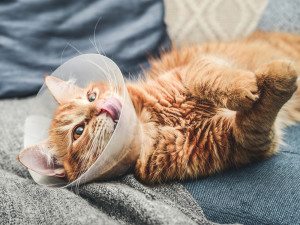When Can a Kitten Be Neutered?
Learn the benefits of doing so ASAP.
In This Article:
When Can A Male Kitten Be Neutered? Early Neutering vs. Traditional Timing How Much Does Neutering A Kitten Cost? Male Kitten Neutering Aftercare Frequently Asked Questions
Neutering can be done as young as six weeks, though traditional advice suggests waiting until a kitten is five to six months old. However, some vets may recommend neutering as early as eight to twelve weeks of age, provided the kitten is healthy.
When can a male kitten be neutered?
It can be tough to think about scheduling a surgical procedure amid all the excitement and stress of adding a kitten to your home. Some male kittens adopted from animal shelters or rescue organizations may already be neutered, leaving one less thing for you to worry about. But if your male kitten is adopted or adopts you (as some stray kittens do) with testicles intact, you’ll have to figure out the best time to neuter.
The answer to this question is multifaceted, and your veterinarian’s advice is key in helping you with this. Your vet will be familiar with your new kitten’s weight, health status, and home environment factors, so they will be able to give you personalized advice about the best time to neuter. In general, kittens can be neutered safely as early as six weeks of age. Neutering this early is more common in shelter situations, where population control is key.
How much do you spend on your pet per year?
For kittens that have found a home, neutering often comes a little later in life. The American Association of Feline Practitioners recommends that male kittens not intended for breeding be neutered by five months of age. In 2008, veterinarians typically recommended neutering male kittens at around five and a half months. However, this may have changed as studies continued to show the safety of early neutering. Because some kittens can reproduce before they’re five months old, how old is right for kitten neutering depends on each household’s situation.
Early neutering vs. traditional timing
Male kitten neutering is usually a very quick surgical procedure, but it still requires anesthesia to be performed in a way that is safe and minimizes pain. The lower limit of what age a kitten can be spayed or neutered is affected by their ability to tolerate anesthesia, recover from surgery, and continue to develop normally.
Benefits of early neutering
Early neutering ensures that kittens don’t reproduce unexpectedly, especially with siblings. Studies have shown that neutered cats are expected to live longer, and curbing risky behaviors early helps to ensure that. Anecdotally, younger kittens seem to bounce back from the surgical procedure more quickly as well. Some of the expected benefits of early neutering for kittens include:
Reduced urine marking and urine odor: Intact male cat pee stinks, and they want to spray it on everything. Early neutering prevents tomcat urine odor and greatly reduces the likelihood of cats marking their territory by peeing on vertical surfaces.
More svelte appearance: Male sex hormones cause the development of heavier musculature and thickened facial tissue and jowls. Kittens neutered early tend to be longer-limbed and have smoother facial features.
Reduced risk of asthma and gingivitis: Kittens neutered before five and a half months old had lower incidences of health issues like feline asthma and gingivitis. These benefits were not seen in kittens neutered between six and twelve months old.
Potential risks
A worry with early neutering is that the lack of exposure to sex hormones could cause problems later in life. Health issues, like cancer, urethral obstruction, arthritis, and gastroenteritis have been studied, but research has not found a link to these conditions and early neutering. Cats neutered early do have delayed closure of the growth plates of their bones, leading to longer legs. This delayed growth plate closure may predispose them to capital physeal fractures, in which the growth plate at the top of the femur breaks off near the hip joint due to trauma or hard landings.
Obesity is another issue seen in neutered cats in general, though it does not seem to be specifically associated with early neutering. Watching your kitten’s diet and keeping them at a healthy body weight will pay off long term in increased mobility and decreased pain and arthritis.
Expected behavioral changes
Male kittens start developing territorial instincts early. In addition to largely eliminating urine-marking behavior, early neutering can help to:
Reduce fighting. Sex hormones make cats more territorial, which creates problems with housemates and other cats. Neutered cats are less likely to pick fights, which means fewer wounds, abscesses, and transmissible diseases like FIV.
Reduce roaming. Intact male cats do not want to stay in the house and will be quite insistent about roaming the neighborhood, especially if they can smell a cat in heat. Indoor cats live longer, in part because they don’t get hit by cars, jump off rooftops or trees, or suffer attacks by wildlife.
Reduce aggression. Unneutered male cats were more likely to be aggressive toward veterinarians. This human-directed aggression can make life more difficult for cats when they encounter new people or situations.
Factors impacting ideal neutering timing
The major factors impacting the timing of a neuter for a kitten are as follows:
Age
Weight
Concurrent health issues
Environment (animal shelter versus foster home vs. permanent home)
When can a kitten be declawed and neutered?
Although declawing has been performed at the same time as neutering, declawing kittens is not humane and is now banned in some U.S. cities and states. The declawing procedure removes more than just the nail: It amputates the entire third bone of each digit. Talk to your veterinarian about more humane alternatives if you are considering declawing your kitten.
When is it too late to neuter a cat?
It’s never too late to neuter a cat. Male cats adopted late in life can be neutered and can make great pals. It may take a little bit of time for some of their secondary sex characteristics, like urine odor and facial thickening, to go away, but many tomcats are happy to ease into retirement in a cozy home.
How much does neutering a kitten cost?
The cost of neutering a kitten will vary greatly depending on your location. Animal shelters and rescue organizations may provide vouchers to cover the cost of a neuter with some local veterinary clinics. High-quality, high-volume spay-and-neuter clinics can be an affordable option for many people and are often able to keep costs under $100 for an uncomplicated kitten neuter. If you have an established relationship with your veterinarian, you can discuss their costs for neutering. They may have packages that include blood work, post-operative pain control, and follow-up examinations.
Male kitten neutering aftercare
Your vet can give you specific aftercare instructions to help smooth your kitten’s recovery after neutering. The timing of the first meal after surgery will depend on what time the day the procedure was performed, but most kittens will be able to eat after returning home. A soft or hard cone may be necessary to prevent licking at the surgery site. Kittens aren’t super tolerant of wearing cones, so your vet may give your kitten a chance to see how they do without one.
Avoiding running, jumping, climbing, and rough play for a week is usually recommended after a neuter to allow time for healing. This activity restriction is often the toughest part for kitten parents — most kittens bounce back quickly from the procedure and want to get back to their usual mayhem.
FAQs (People also ask):
What is the cost of kitten neutering and ownership?
The cost of a kitten neuter varies depending on location and the clinic where it’s performed. Some high-quality, high-volume surgical practices may neuter kittens for less than $100. Figuring out kitten parenthood costs can be complex.
What is the best male kitten neutering aftercare?
Follow your vet’s advice for at-home care after your kitten is neutered. Common kitten neuter aftercare recommendations include limiting activity, preventing self-trauma, and monitoring for any surgical complications.
References:
Long-Term Risks and Benefits of Early-Age Gonadectomy in Catsopens in new tab
Short-Term Results and Complications of Prepubertal Gonadectomy in Cats and Dogsopens in new tab
AAFP Position Statement: Pediatric Sterilization in Catsopens in new tab
Association of Shelter Veterinarians: Position Statement: Early Age Spay Neuteropens in new tab
Neutering Is Not Associated With Early-Onset Urethral Obstruction in Catsopens in new tab
Effects of Prepubertal Gonadectomy on Physical and Behavioral Development in Catsopens in new tab
Opinions of Veterinarians About the Age at Which Kittens Should Be Neuteredopens in new tab












